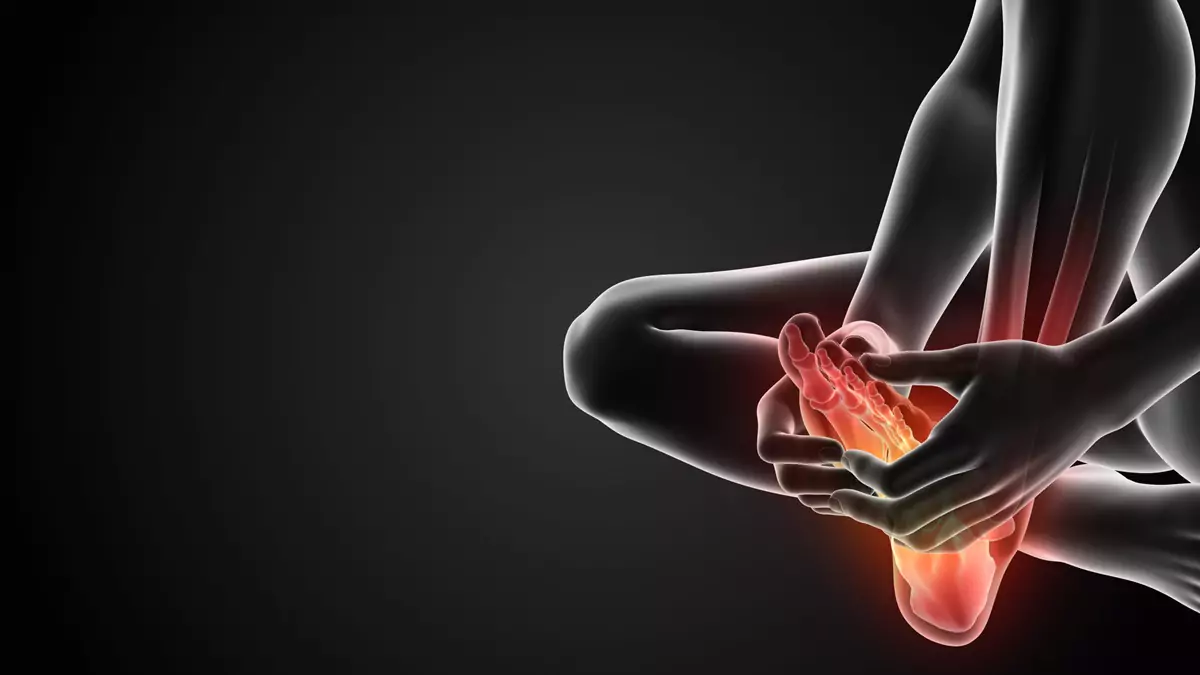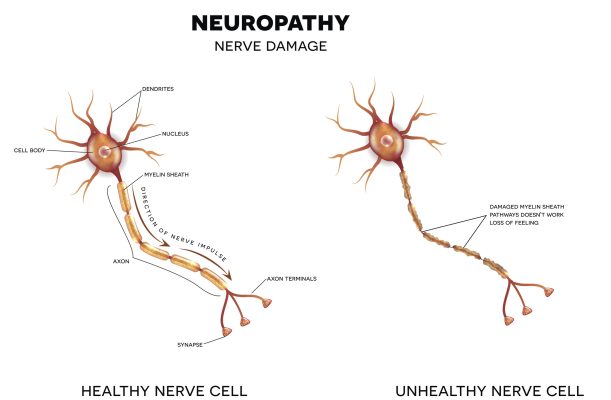
UP TO 40% OFF SITEWIDE






8 Simple Ways to Treat Nerve Pain at Home


Table of Contents
- Common Causes of Nerve Pain
- 1. Diabetes
- 2. Trauma or Injuries
- 3. Repetitive Movements
- 4. Alcohol Consumption
- 5. Certain Medications
- Understanding the Symptoms of Nerve Pain
- Burning or Shooting Sensations
- Numbness or Tingling
- Muscle Weakness
- Sensitivity to Touch or Temperature
- The Importance of Early Intervention in Nerve Pain Management
- 8 Simple Ways to Treat Nerve Pain at Home
- Rest and Relaxation
- Heat and Cold Therapy: A Dual Approach to Pain Relief
- Exercise for Nerve Pain
- The Role of Stress in Nerve Pain
- Limiting Alcohol Intake to Manage Nerve Pain
- Maintaining a Balanced Diet for Nerve Health
- Topical Treatments for Nerve Pain
- Foot Care for Nerve Pain
- The Role of Supplements in Nerve Pain Management
- Conclusion
- About The Author
Experiencing nerve pain can be a daunting ordeal. But what if there was a way to treat nerve pain at home? A method that doesn't require frequent visits to the doctor or reliance on heavy medications. The good news is there are ways to alleviate this discomfort right in the sanctuary of your home. With the increasing prevalence of conditions leading to nerve pain the quest for effective home remedies has never been more crucial.
In this comprehensive guide, we'll delve deep into understanding nerve pain and explore simple yet effective strategies to treat nerve pain at home. So, if you or a loved one has been grappling with the challenges of neuropathic pain, stay with us. Relief might be closer than you think and the journey to reclaiming your comfort starts here.
Common Causes of Nerve Pain
The causes of nerve pain are diverse and understanding them can be crucial for effective management and treatment. Here, we delve deeper into some of the most common triggers of nerve pain.
1. Diabetes
Diabetes is one of the most prevalent causes of neuropathy. High blood sugar levels, a hallmark of diabetes, can damage nerves over time, especially in the feet and hands. This type of neuropathy is known as diabetic neuropathy. Symptoms can range from tingling and numbness to severe pain. Proper management of blood sugar levels is essential to prevent or minimize the progression of diabetic neuropathy.
2. Trauma or Injuries
Physical traumas or injuries, such as those from accidents, falls, or surgeries, can lead to nerve damage. When nerves are compressed, stretched, or severed, it can result in pain, numbness, or weakness in the affected area. Conditions like herniated discs or carpal tunnel syndrome, where nerves are compressed, are classic examples of trauma-induced neuropathy.
3. Repetitive Movements
Engaging in repetitive motions, especially without proper ergonomics, can lead to nerve compression and subsequent pain. Conditions like carpal tunnel syndrome can develop from repetitive hand movements, especially in professions that require constant typing or assembly line work.
4. Alcohol Consumption
Excessive alcohol intake can have toxic effects on nerves, leading to alcoholic neuropathy. This condition can manifest as numbness, tingling, or pain in the extremities. Over time, heavy alcohol use can also lead to muscle weakness and atrophy.
5. Certain Medications
While medications are designed to treat various ailments, some can have side effects that affect nerve health. Drugs used in chemotherapy, certain antiviral medications for HIV and some drugs for treating seizures can cause neuropathy. It's essential to discuss potential side effects with a healthcare provider when starting a new medication. Therefore, understanding the underlying causes of nerve pain is the first step in seeking appropriate treatment.
Whether it's managing underlying conditions like diabetes, making lifestyle changes, or adjusting medications, addressing the root cause can offer significant relief. It's crucial to consult with healthcare professionals to get a proper diagnosis and tailored treatment plan.
Understanding the Symptoms of Nerve Pain
Unlike other types of pain that arise from an injury to the body, nerve pain is often the result of the nerves themselves sending false signals. This can lead to a variety of symptoms that can be distressing and challenging to manage. Let's delve deeper into the common symptoms associated with nerve pain.
Burning or Shooting Sensations
One of the hallmark symptoms of nerve pain is a burning or shooting sensation. This type of pain can be sudden and intense, often described as an electric shock. It's not uncommon for individuals to experience these sensations sporadically, with episodes lasting for a few minutes to several hours. The pain can be triggered by various factors, including certain body positions or activities. For some, even a light touch or change in temperature can provoke these painful episodes.
Numbness or Tingling
Numbness or tingling, often referred to as "pins and needles," is another prevalent symptom of nerve damage. This sensation can be likened to the feeling one gets when a limb "falls asleep." It's a result of the nerves failing to transmit signals properly. Over time, if left untreated, this numbness can become more persistent, leading to a complete loss of sensation in the affected area. This can be particularly concerning as it may result in unseen injuries, especially in areas like the feet where unnoticed wounds can lead to complications.
Muscle Weakness
Nerve damage can also impact muscle function. When nerves that communicate with muscles are affected, it can lead to muscle weakness. This can manifest as difficulty in performing everyday tasks, such as gripping objects or walking. In severe cases, muscle atrophy or shrinkage can occur, further exacerbating the weakness. It's essential to address this symptom early on, as it can affect balance and increase the risk of falls and injuries.
Sensitivity to Touch or Temperature
An increased sensitivity to touch or temperature changes is another common symptom of nerve pain. This heightened sensitivity, known as allodynia, can make even the lightest touch or a slight change in temperature feel painful. For instance, some individuals might find the weight of a bedsheet or the sensation of clothing against the skin unbearable. Similarly, exposure to cold or heat can trigger intense pain, making tasks like showering or holding a cold glass challenging.
Recognizing the symptoms of nerve pain is the first step towards seeking appropriate treatment and improving one's quality of life. While the symptoms mentioned above are common, nerve pain can manifest differently in different individuals. It's crucial to consult with a healthcare professional if you suspect you're suffering from nerve pain to get a proper diagnosis and begin a suitable treatment regimen.Neuropathy, damage of nerves. This can be caused by Diabetes.

The Importance of Early Intervention in Nerve Pain Management
When nerve pain first manifests, it's often a signal from the body that something is amiss. It could be due to inflammation, injury, or a systemic issue like diabetes. Addressing the root cause early on cannot only alleviate the immediate pain but also prevent the condition from worsening. For instance, in the case of diabetic neuropathy, early management of blood sugar levels can prevent further nerve damage. Ignoring these early signs can have dire consequences.
Persistent nerve pain that goes untreated can result in permanent nerve damage. Once nerves are damaged they may not function correctly, leading to a loss of sensation or even paralysis in extreme cases. This can significantly impact an individual's quality of life, limiting their mobility and independence. Furthermore, untreated nerve pain can have psychological implications. Chronic pain can lead to feelings of frustration, depression and anxiety.
It can disrupt sleep patterns, leading to fatigue and decreased cognitive function. Over time, this can strain personal relationships and hinder professional performance. In addition to the physical and psychological implications, delayed treatment can also lead to increased medical expenses in the long run. What might have been managed with simple interventions initially could require more intensive treatments or even surgeries later on.
8 Simple Ways to Treat Nerve Pain at Home
Rest and Relaxation
Amidst the hustle and bustle of daily life, it's easy to overlook the importance of rest and relaxation in managing such discomfort. However, ensuring adequate rest is paramount in the journey towards alleviating nerve pain.
Why Rest is Crucial
The body has its natural healing mechanisms and rest plays a pivotal role in facilitating this process. When we rest:
- Cellular Repair: Our cells, including nerve cells, undergo repair and regeneration. This is especially vital when nerve damage is the underlying cause of the pain.
- Muscle Recovery: Overworked muscles can contribute to nerve compression. Rest allows muscles to relax, potentially relieving some of the pressure on affected nerves.
- Stress Reduction: Chronic stress can exacerbate nerve pain. A well-rested mind and body can better cope with stressors, reducing the intensity of pain.
How to Ensure Quality Rest
Achieving quality rest is more than just getting the recommended 7-9 hours of sleep. Consider the following:
- Comfortable Sleeping Environment: Ensure your bedroom is conducive to sleep. This includes a comfortable mattress, appropriate room temperature and minimal light and noise.
- Routine: Establishing a consistent sleep schedule can regulate your body's internal clock, making it easier to fall and stay asleep.
- Limit Stimulants: Avoid caffeine or other stimulants close to bedtime. These can interfere with your ability to fall asleep.
- Mindfulness and Meditation: Techniques such as deep breathing, meditation and progressive muscle relaxation can prepare your mind and body for rest.
Heat and Cold Therapy: A Dual Approach to Pain Relief
Heat and cold therapy have been age-old remedies for various types of pain, including nerve pain. Their benefits are manifold and understanding when and how to use them can provide significant relief.
Heat Therapy
Applying heat can increase blood flow to a particular area, promoting healing and relaxation. It can also reduce muscle spasms, a common contributor to nerve pain. Methods include:
- Warm Towels: Soak a towel in warm water, wring out the excess and apply to the affected area.
- Heating Pads: These are readily available and can be placed on the painful area.
- Warm Baths: A warm bath can relax tense muscles and provide overall relief.
Cold Therapy
Cold therapy can reduce inflammation, a common cause of nerve compression and pain. It also numbs the affected area, providing immediate relief. Methods include:
- Ice Packs: Always wrap ice packs in a cloth to prevent frostbite. Apply to the affected area for 15-20 minutes.
- Frozen Vegetables: In the absence of ice packs, a bag of frozen peas can be an effective alternative.
- Cold Compress: Soak a cloth in cold water, wring out the excess and apply.
Exercise for Nerve Pain
Nerve pain, a demoralizing condition that affects countless people worldwide, can be a severe impediment to daily life. Often described as a burning, tingling, or numbing sensation, it can arise from various causes, including diabetes, trauma and repetitive strain. While medications and therapies offer relief, two often-overlooked strategies are exercise and stress management. Let's delve into how these can be pivotal in managing nerve pain.
The Power of Exercise
Exercise, contrary to some beliefs, can be a potent tool against nerve pain. Here's why:
- Improved Circulation: Regular physical activity enhances blood flow, ensuring that essential nutrients reach nerve cells. This can aid in nerve repair and reduce pain symptoms.
- Muscle Strengthening: Strong muscles can act as a cushion for nerves, preventing further damage. For instance, exercises targeting the back can alleviate sciatic nerve pain by reducing pressure on the nerve.
- Endorphin Release: Physical activities release endorphins the body's natural painkillers. These chemicals can help diminish nerve pain, elevating mood in the process.
- Flexibility and Mobility: Stretching exercises improve flexibility which can prevent nerve compression. Yoga and Pilates, for instance, emphasize stretching and can be beneficial for those with nerve pain.
Starting an Exercise Regimen
If you're new to exercise or have been inactive due to nerve pain, it's crucial to start slow. Begin with low-impact exercises like walking, swimming, or cycling. As your strength and endurance build, you can gradually increase the intensity. Remember, it's essential to listen to your body and avoid overexertion which can exacerbate pain.
The Role of Stress in Nerve Pain
Stress, both physical and emotional, can intensify nerve pain. When we're anxious or under pressure the body releases stress hormones that can heighten pain sensitivity. Moreover, chronic stress can lead to muscle tension, potentially compressing nerves and causing pain.
Stress Management Techniques
Managing stress can significantly reduce nerve pain. Here are some effective strategies:
- Meditation: This ancient practice calms the mind, reducing stress hormones. Regular meditation can also improve pain tolerance.
- Deep Breathing: Simple yet effective, deep breathing exercises can relax the body and mind, alleviating stress-induced pain.
- Progressive Muscle Relaxation: This technique involves tensing and then relaxing different muscle groups, promoting relaxation and reducing muscle tension that can aggravate nerve pain.
- Engaging in Enjoyable Activities: Doing things you love, whether it's reading, gardening, or painting, can divert your mind from pain and reduce stress.
Incorporating these techniques into your daily routine can make a significant difference in managing nerve pain. Remember the mind and body are intricately connected; by taking care of one, you benefit the other.
Limiting Alcohol Intake to Manage Nerve Pain
Alcohol, while often enjoyed socially or in moderation, can have detrimental effects when consumed excessively, especially concerning nerve health. Chronic and heavy alcohol consumption can lead to a condition known as alcoholic neuropathy. This condition is characterized by nerve damage that results from long-term alcohol abuse. The nerves affected most frequently are those in the arms and legs, leading to a range of symptoms that can significantly impact one's quality of life.
Symptoms of Alcoholic Neuropathy:
- Tingling or numbness in the extremities
- Muscle weakness or atrophy
- Heat intolerance, especially in the feet
- Impaired coordination and balance
- Burning or aching sensations
The exact cause of alcoholic neuropathy remains unclear, but several factors are believed to play a role. These include the direct toxic effects of alcohol on nerve cells, nutritional deficiencies arising from alcoholism (especially vitamin B deficiencies) and the buildup of harmful substances in the body when the liver is damaged. To prevent or manage nerve pain associated with alcohol consumption, it's crucial to:
- Reduce Alcohol Intake: Moderation is key. If you're experiencing symptoms of nerve pain, consider cutting back on your alcohol consumption or eliminating it altogether.
- Stay Hydrated: Drinking water can help dilute the alcohol in your bloodstream and promote faster elimination from the body.
- Seek Medical Advice: If you suspect you have alcoholic neuropathy, consult a healthcare professional. They can provide guidance on managing symptoms and recommend treatments.
Maintaining a Balanced Diet for Nerve Health
Diet plays a pivotal role in overall health and nerve health is no exception. Consuming a balanced diet rich in essential vitamins and minerals can support nerve function and reduce the risk of nerve damage.
Key Nutrients for Nerve Health:
- Vitamin B12: Essential for nerve function and the formation of red blood cells. A deficiency can lead to nerve damage.
- Vitamin B6: Supports nerve health and is crucial for brain development and function.
- Vitamin D: Has neuroprotective effects and supports nerve and muscle function.
- Omega-3 Fatty Acids: These can help reduce inflammation which may benefit those with nerve pain.
- Magnesium: Plays a role in nerve impulse conduction and muscle contraction.
To ensure you're getting these essential nutrients:
- Diversify Your Diet: Incorporate a mix of fruits, vegetables, lean proteins, whole grains and healthy fats.
- Limit Processed Foods: These often lack essential nutrients and can be high in sugar and unhealthy fats which can exacerbate nerve pain.
- Stay Hydrated: Water supports overall health, including nerve function.
- Consult a Nutritionist: If you're unsure about your dietary needs or how to achieve a balanced diet, consider seeking advice from a nutritionist.
Topical Treatments for Nerve Pain
Nerve pain, particularly in diabetic feet, can be a debilitating condition that affects many aspects of daily life. While there are various treatments available, topical applications and dedicated foot care have proven to be effective in providing relief. Let's delve deeper into these methods. Topical treatments are directly applied to the skin, targeting the affected area. They offer a localized approach to pain relief, ensuring that the active ingredients are delivered precisely where they're needed.
- Capsaicin Creams: Derived from chili peppers, capsaicin is a common ingredient in over-the-counter pain relief creams. When applied to the skin, it can cause an initial burning sensation which is a sign that it's working. Over time, capsaicin may reduce the ability of nerve cells to transmit pain messages, providing relief from symptoms.
- Lidocaine Patches: Available both over-the-counter and by prescription these patches contain the local anesthetic lidocaine. They numb the area, blocking pain signals from reaching the brain. They're particularly useful for targeted relief.
- Herbal Ointments: Some ointments contain herbs with anti-inflammatory and analgesic properties. Ingredients like menthol, derived from peppermint plants and other herbs like balm of gilead and calendula flowers can offer soothing relief.
- Over-the-Counter Solutions: There are numerous products available, such as Biofreeze, Icy Hot and Tiger Balm which can provide temporary relief for minor pain close to the skin's surface.
Foot Care for Nerve Pain
For those experiencing foot pain due to neuropathy or other conditions, dedicated foot care is essential.
- Soaking in Warm Water and Epsom Salt: This simple remedy can provide immediate relief. The warm water improves circulation, while Epsom salt, rich in magnesium, can reduce muscle soreness and inflammation.
- Compression Socks: These specially designed socks apply pressure to your ankles and legs, promoting blood flow and reducing pain and swelling. They can be particularly beneficial for those with peripheral neuropathy.
- Daily Foot Checks: For individuals with conditions like diabetes, daily foot checks are crucial. This routine helps in identifying any injuries, infections, or abnormalities early on, preventing complications.
- Massage: Gently massaging your feet can stimulate nerves and improve circulation. It's also a great way to relax and alleviate stress, a common trigger for nerve pain.
The Role of Supplements in Nerve Pain Management
In the quest to manage and alleviate nerve pain, supplements have emerged as a promising avenue. Among the plethora of options available, SugarMD Neuropathy Support stands out due to its targeted approach to nerve health. This homeopathic supplement is not just another addition to the market; it's a meticulously crafted solution designed to shield nerves from the detrimental effects of elevated blood glucose levels and other oxidative challenges.

Let's delve deeper into the key ingredients that make SugarMD Neuropathy Support a noteworthy choice:
- Benfotiamine: A derivative of vitamin B1, benfotiamine plays a pivotal role in protecting vascular health. Elevated blood sugar levels can wreak havoc on blood vessels, especially the tiny capillaries that nourish our nerves. By ensuring the health of these vessels, benfotiamine indirectly supports nerve vitality.
- Alpha-lipoic acid: Renowned for its antioxidant properties, alpha-lipoic acid is a warrior against oxidative stress, a major culprit behind nerve damage. By bolstering the body's antioxidant defenses, it aids in shielding nerves from harm.
- Acetyl L-Carnitine: Beyond its role in energy production, Acetyl L-Carnitine has shown potential in combating nerve damage. Additionally, its benefits extend to cognitive health, making it a dual-action ingredient.
- Vitamin B12: A crucial nutrient for nerve function, Vitamin B12 is responsible for maintaining the integrity of the nerve's myelin sheath. This protective layer is vital for nerve signal transmission.
- Vitamin B6: Essential for various bodily functions, Vitamin B6's role in safeguarding nerve endings is particularly noteworthy. It ensures that nerve signals are transmitted efficiently.
- Vitamin D: Often associated with bone health, Vitamin D's neuroprotective effects are gaining recognition. It aids in synthesizing neurotrophins which combat oxidative damage to the nervous tissue.
Conclusion
In Conclusion, managing nerve pain requires a multifaceted approach. While lifestyle changes and home remedies are invaluable, supplements like SugarMD Neuropathy Support offer an added layer of protection and healing. By understanding and harnessing the power of these ingredients, individuals can take a proactive step towards better nerve health and, consequently, an improved quality of life.
About The Author
Meet Dr. Ahmet Ergin a highly skilled and dedicated endocrinologist with a passion for diabetes care. Dr. Ergin earned his medical degree with honors from Marmara University in Istanbul. He completed internal medicine residency and endocrinology fellowship at Cleveland Clinic.
Dr. Ergin is board-certified in Internal Medicine, Endocrinology, Diabetes and Metabolism due to his vast medical expertise. He's a certified diabetes educator, author of "The Ultimate Diabetes Book," and founder of "the SugarMD YouTube channel."
Dr. Ergin offers exceptional diabetes care to his patients in Port Saint Lucie, FL, helping them manage effectively. Disclaimer: These statements have not been evaluated by the Food and Drug Administration. Information on this website isn’t intended to treat, cure or prevent any disease. Discuss with your doctor and do not self-treat.
Written By Dr. Ahmet Ergin
465 total articles
Meet Dr. Ahmet Ergin, a highly skilled and dedicated endocrinologist with a passion for diabetes care. Dr. Ergin earned his medical degree with honors from Marmara University in Istanbul. He completed internal medicine residency and endocrinology fellowship at Cleveland Clinic. Dr. Ergin is board-certified in Internal Medicine, Endocrinology, Diabetes, and Metabolism due to his vast medical expertise. He's a certified diabetes educator, author of “The Ultimate Diabetes Book,” and founder of “the SugarMD YouTube channel.” Dr. Ergin offers exceptional diabetes care to his patients in Port Saint Lucie, FL, helping them manage effectively. For a closer look into his insights and experiences, connect with Dr. Ahmet Ergin on LinkedIn, Instagram, and YouTube.”
Disclaimer: These statements have not been evaluated by the Food and Drug Administration. Information on this website isn't intended to treat, cure or prevent any disease. Discuss with your doctor and do not self-treat.
Products











